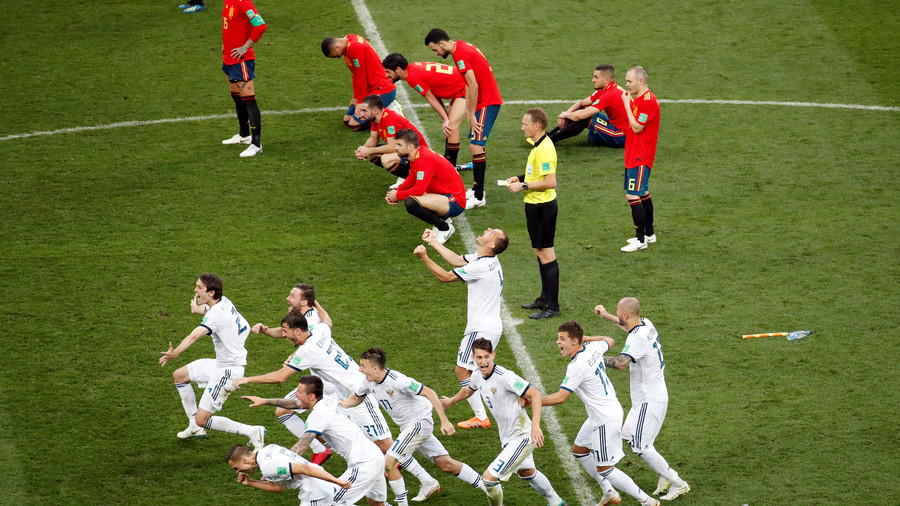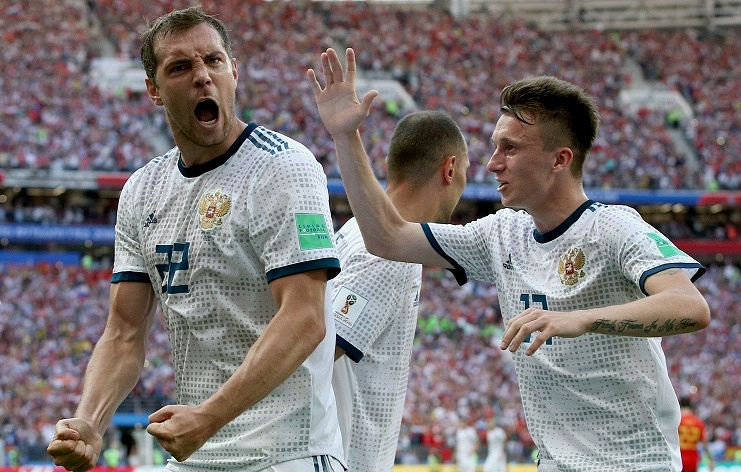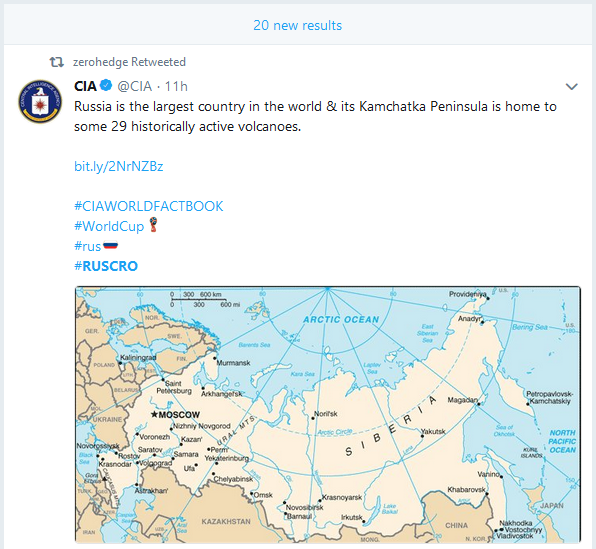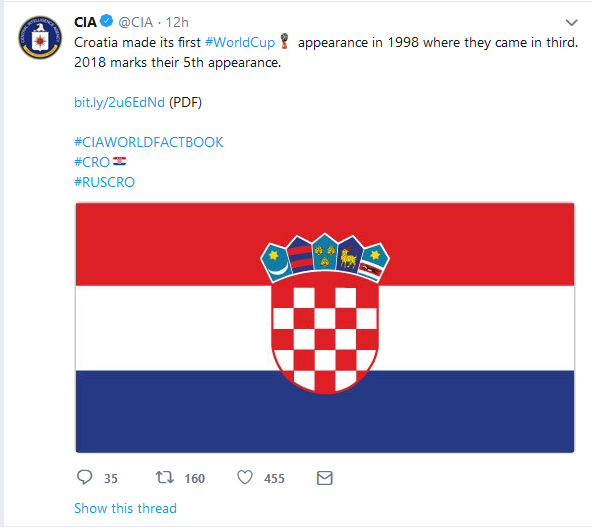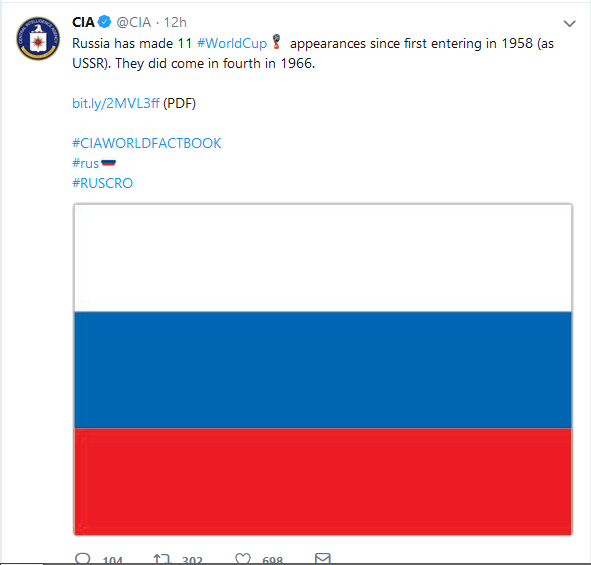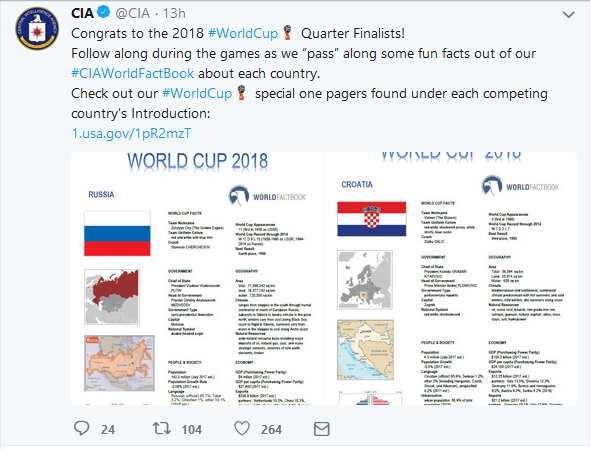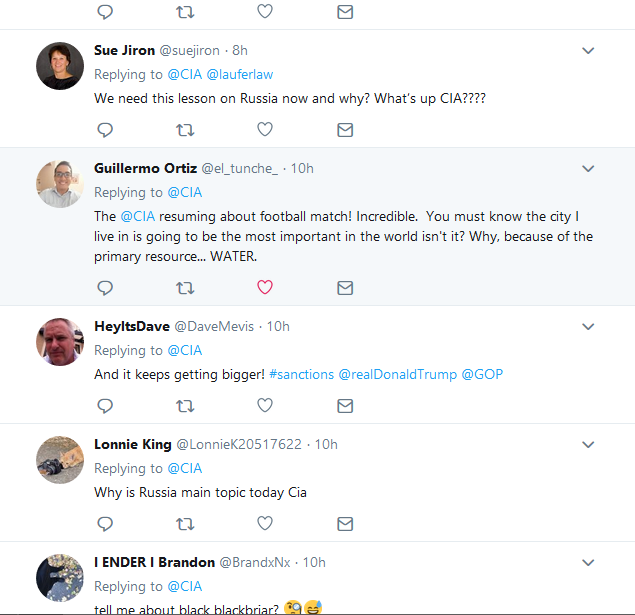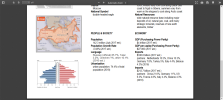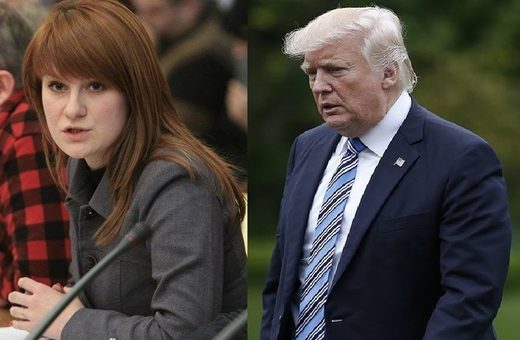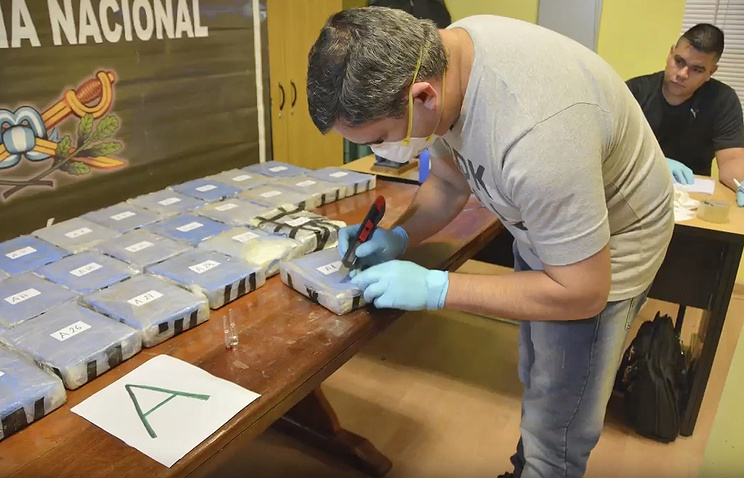Russia Insider
Russians Are Happier, Healthier, Wealthier and More Moral Than You Think - From an American Eyewitness
Wed, Jun 27, 2018 Hal Freeman (Bold and Front Size, articles emphasis)
An American Christian presents statistics and gives his take on why Russians are actually satisfied with Putin's rule, confidently countering the belief nurtured so carefully by the Western media that Russians are miserable and dissatisfied
According to my calendar June 20 is the last day of spring. It has been a good one in Russia! When I was a kid growing up in South Carolina, I never understood the “solstice” explanation. I had no idea why they said summer started the third week in June. Most years, I had been playing outside barefoot, dressed in tee shirts and shorts for two months. Not every year was like that, but by June it was always HOT.

Spring is not nearly as dependable here in the northwest section of Russia. Last year I thought the winter would not end. We even had a couple of significant snowfalls in May. This year, however, May was beautiful and warm. We had to get out our fans to cool our apartment. June is usually quite wet where we live in Russia, but this year we’ve had only a few rains, and the weather is actually cooler than in May. This morning it is 62 degrees (F). That is what it is most mornings when I walk. I love it.
Russians really appreciate good weather. You can almost sense the better mood in the streets. This year the World Cup is in Russia, and that has added to the excitement.
I’ve read a few reports from journalists on how surprised they have been at the way things are here. Thus far the games are turning out to be the positive exercise of what some call Russian “soft-power,” or showing the world that things here are quite different than what they have been told.
Despite the fact no American team is participating I saw a report that there are huge crowds of American tourists who came to Russia despite Homeland Security’s baseless travel warnings. I am quite sure there are those at work in the West trying to undermine this very positive view of the events. Many of us fear some kind of international incident designed to make Russia look bad.
Apparently, the optimism of the Russian people is not totally (or mostly) generated by the weather.
According to a recent TASS poll 83% of Russians have a positive view of life here.
Most consider themselves “lucky.” (See More than 80% of Russians say they are happy — poll) The main factors are family, parenthood and work. I was surprised that even among the over 60 age group and those in the lower income categories a majority of respondents feel good about things here. Health was also a factor. Russians are drinking and smoking less and also watching TV fewer hours since the last poll they did.
Since 2000 the average lifespan in Russia has gone up by six years to 72.6. Obviously there are still unhappy and unfortunate people in Russia, but things are looking up.
I realize this is not the picture most people get of Russia. I somehow unintentionally got linked to a site called Quora. I was doing some research and ended up on the site. It is a site where people ask questions on pretty much anything. I saw that in response to a question about life in Russia, someone had posted a link to my blog.
After that I immediately started getting feeds letting me see questions about Russia. The questions are sometimes ridiculous and betray a complete ignorance of Russia. Most of the answers, however, are quite insightful and thorough.
One question from May 29 caught my attention: “Why do Russians still overwhelmingly support Putin even though their living standards did not get any better under his rule?”
Fortunately the responder was able to show things have gotten much better. I will give my “take” on the increasingly positive atttitude among Russians. Whether one wants to give Putin no credit, partial credit, or most of the credit is not my purpose. Also, my list is partly based on a few statistics and partly a “worm’s eye view” from my life here, meaning life here on the ground.
1 “The economy, stupid.”
That is a phrase James Carville, who was a leader in Bill Clinton’s campaign, came up with when Clinton successfully challenged George H.W. Bush for the presidency in 1992. (Usually stated, “It’s the economy, stupid.”) In early 1991 after the invasion of Iraq, Bush’s popularity soared. Clinton was able to direct people’s attention back to the rather bleak economic situation and win the election.
I have stated before I’m no economist. But I look at numbers that are easy for people like me–like the stock market. The Russian stock market has blossomed of late. It is up around 2,300 most days.
Back in April it took a nose dive when another round of sanctions were announced. Apparently the “oligarchs” were going to be hit hard. It quickly rebounded, however, to breaking the “highest ever” notch.
Now, I’m not one who believes the stock market is the best or most reliable indicator of a nation’s economy. But it is relevant. In 1998 Russian stock stood at 18. That’s eighteen, not 1,800. Poverty in Russia has been reduced by over half since then, and the GDP has grown by leaps and bounds. Pensions in Russia have risen by 10 times since 2000.
Observations from the eye of the worm. My wife has been going to a masseuse lately. This lady says she works over 12 hours a day. It is her own private business and has more clients than she can handle. Oksana asked her how does she do it physically. She says she is also a manicurist and she alternates times of doing the heavy work of massages with doing pedicures and manicures. She said she is amazed how many ladies in Luga now can afford to come weekly for those. Her description of her small business demonstrates how different things are from when I came here in 2002.
It’s not just small businesses, however. We’ve got a new grocery store right next to our apartment! “Spar” has opened a nice new store with a wide variety of foods and other items. I personally know of at least four new large grocery stores and one small mall that have opened in this little town in the two years we’ve been here. That does not include the numerous other businesses that have opened.
Who or what is responsible? As I read Western reports which actually admit things are better, they most often somehow weirdly blame (not credit) Putin. He’s corrupt; his government is a bunch of oligarchs; he got lucky with oil prices.
Michael McFaul, Obama’s ambassador to Russia, tries to make Russia look more pitiful and evil today. In his recent debate with Stephen Cohen, I even heard him praise the 90s again (although he tried to quickly qualify his remark).
The 90s was good for “master America” and the oligarchs they were funding. Oddly I hear a lot of bad things about “Putin’s oligarchs” these days. Do people not realize the U.S. help create those oligarchs?
And when Putin fights them, he’s called a dictator. If he works with them, it’s “Putins’ oligarchs.” If he reins in on them, he’s a dictator. Makes for easy reporting.
The bottom line is despite sanctions and despite so-called corruption, the people here are doing better economically. Still, it seems America will continue to level more and more sanctions because…well, if you can’t think of a good policy, issue more sanctions. Maybe the “oligarchs” are hurting. But from the worm’s eye view, sanctions have not impacted regular folks’ lives.
Another factor is worth considering is the fact Russia’s sovereign debt is $575 BILLION. By comparison Britain’s is $7.5 TRILLION; France–$5 trillion, and the U.S. debt is 21 trillion dollars. Since Russia has $450 billion in foreign reserves, this makes the picture even more positive for Russia.
2 People feel safer.
Despite the fact that NATO continues to flex its military muscle and inch closer and closer to Russia, people here feel more secure. The reason Russia had to suck up to America in the 90s is because it had no options. The military was in shambles.
The Rand Corporation is a think tank started by Douglas Aircraft Co. to offer research and analysis on armed forces, among other things, for the U.S. Government. In 2014 at the time of the Ukrainian crisis, they reported on the Russian military and, in essence, said Russia was more bark than bite. While stating advances had been made by Russia, the overall gist of the report was the U.S. had little to fear if there were a direct confrontation.
The 2017 report read quite differently, however. Based on its observations of the Russian military activities in Syria they concluded, “Starkly, assessments in this report will show US forces could, under plausible assumptions, lose the next war they are called on to fight.” They also cautioned this was simply based on what they had observed in Syria and believed Russia had other superior armaments that they had not displayed.
In his speech back in March of 2018, Vladimir Putin showed a video of new long-range missiles (among other things) with startling capacities. While the immediate reaction from many in the States was that he was bluffing, some older “grey beards” from the Reagan era cautioned he was not. No evidence had been produced indicating his claims are not valid. Several have confirmed they are. Space does not allow me to discuss each of the points of his presentation, but the overall gist was that there are valid reasons Russians do not feel like an inferior opponent as they did in the 90s.
Donald Trump immediately said we don’t need another arms race. Putin’s response (to the Russian people) was that Russia does not want or need to escalate defense spending. He announced further REDUCTIONS in military spending and said the money is being redirected to pensions and other needs in domestic affairs.
While well over half the Russian people say they are glad for the military strength of Russia, almost 45% said they believed Putin should spend more on help for average Russians. There are still people struggling here. He has responded and agreed with them.
The reason Russia can do so well militarily is because it rarely goes outside its own borders. Putin sent military help to Syria because he was invited, and because the West, specifically Donald Trump, had said earlier that Russia should join in and fight terrorism.
Oddly, Putin was criticized by the West for fighting terrorists in Syria. Until 1947 the name was “War Department” in America. It eventually became, “The Department of Defense.” It really still is a war department. America has not had to defend itself since the attack on Pearl Harbor.
Thus, the U.S. spends over 10 times what Russia does on its military and now, by its own research, has an inferior military to Russia.
3 “Family Values.”
The main factor Russians listed for their positive feelings about life was the family, not the economy or military.
For 70 years Russians were taught that the family was not the focus of life. Socialism shifted the attention to labor in the name of “the bright future.” The traditional Christian values of Russia’s long heritage could no longer be taught. Children were the responsibility of the state.
A recent Levada poll indicated that on most family issues the trend in Russia is back to more traditional values. (POLL: Christian Values on Sodomy, Abortion, Surge In Russia - 83% Reject Homosexuality | A Russian Orthodox Church Website)
Since this includes negative views on homosexuality, trans-gender issues, as well as abortions, many in the West use this as a point of attack. Again, it does not mean homosexuality or abortion are illegal here.
It means the trend in public evaluations are toward a stronger family unit and more disapprove of these practices. Of course, there is far more involved in “family” than the values I mentioned, so one ought not to miss that basic point in the discussion of specific values or morals.
Problems remain, of course, but in general, Russians feel better about life here. They believe their society is becoming a better place for work, family, and one’s health.
Whether deserved or not, Vladimir Putin received 77% of the vote in the March election so many Russians must give him credit. When I turned on the first reviews of the election from America I heard Howard Kurtz from FoxNews ask a guest to talk about “the Russian election” (eye-roll), “the so-called election,” he clarified.
I like some of Kurtz’ reports on the media. Nevertheless, he has no idea what goes on in Russian elections, but obviously, he felt obliged to act like it was fraudulent. The evidence is not important when you bash Russia, and more of your media buddies will approve of you. I switched to other outlets and the descriptions were worse, e.g., “sham election.” It wasn’t a sham election. There were plenty of international observers here. (For an analysis from a true Russian expert who was a part of an international team of observers see Gilbert Doctorow, What I Saw As an Official Observer to the Russian Elections.)
On the other hand, I saw a report yesterday that a Federal judge in Kansas had blocked a new Kansas law that stated one had to be able to prove one is an American citizen before voting in an election. Judge Julie Robinson said the concern for non-citizens voting did not “outweigh the burden of proof of citizenship.” I find it sadly ironic that America condemns Russian elections while it believes no one in America should have the “burden” of having to prove they are legal before they vote.
I saw another headline on the Fox this morning: “Americans’ satisfaction with direction of country at a 12 year high!” I clicked on for more information. It said 38% of Americans are content with the way America is headed—and that’s a 12 year high. Ironically, the number is the inverse of the 83% of Russians who are pleased with the direction their country is headed. Perhaps it is time for America to get the plank out of its own economic/political/military eye before seeing clearly enough to remove any specks from Russia’s cultural corneas.
A video introducing Russian Faith
About the author: Hal Freeman is an American-born Christian academic and blogger who made the ultimate statement by moving his entire family to the Russian provinces from the US a few years ago. His move became imminent after he realized that anti-family direction and propaganda rampant in the West, and which he feared would impair the moral development of his children.
For more on his story visit his blog, which offers a fascinating window into life in Russia and describes how Christianity is transforming the country's culture and politics.
This article originally appeared on a new site about the Christian renaissance in Russia, called Russian Faith. Their introductory video is at end of this article.
SouthFront News
27 Aircraft, 1,140 Personnel Withdrawn From Syria Over Past Days: Putin
28.06.2018
Over the past few days 24 aircraft and 1,140 personnel have been withdrawn from Syria, Russian President Vladimir Putin told the alumni of military academies at a reception on June 28.
“This withdrawal is continuing now. Only over the past several days, 13 planes, 14 helicopters and 1,140 personnel have been pulled out,” Putin said adding that the pullout of Russian forces from Syria began in December 2017. “You and your fellow servicemen together with them will fully use this experience of the personnel’s combat training here in Russia to perform the most difficult and outstanding tasks during snap checks, strategic and tactical exercises, and learn how to use the unique new generation equipment, which the forces start receiving.”
The president said that the expirience gained in Syria must be used in training Russian military personnel.
“The Russian army clearly demonstrated its growing potential and better coordination among military units in the struggle with terrorists in Syria,” he said. “All of you and your fellow servicemen are now to use the experience of that operation in combat training.”
The Russian military kicked off its anti-terrorist operation in Syria in late September 2015. Since then, the Russian military involvement has changed the crouse of the war and has allowed the Damascus government to retake large areas from terrorist groups
Putin: South Korea Becomes Russia's 2nd Important Trade Partner in Asia-Pacific
Russia Insight Published on Jun 27, 2018
Russians Are Happier, Healthier, Wealthier and More Moral Than You Think - From an American Eyewitness
Wed, Jun 27, 2018 Hal Freeman (Bold and Front Size, articles emphasis)
An American Christian presents statistics and gives his take on why Russians are actually satisfied with Putin's rule, confidently countering the belief nurtured so carefully by the Western media that Russians are miserable and dissatisfied
According to my calendar June 20 is the last day of spring. It has been a good one in Russia! When I was a kid growing up in South Carolina, I never understood the “solstice” explanation. I had no idea why they said summer started the third week in June. Most years, I had been playing outside barefoot, dressed in tee shirts and shorts for two months. Not every year was like that, but by June it was always HOT.

Spring is not nearly as dependable here in the northwest section of Russia. Last year I thought the winter would not end. We even had a couple of significant snowfalls in May. This year, however, May was beautiful and warm. We had to get out our fans to cool our apartment. June is usually quite wet where we live in Russia, but this year we’ve had only a few rains, and the weather is actually cooler than in May. This morning it is 62 degrees (F). That is what it is most mornings when I walk. I love it.
Russians really appreciate good weather. You can almost sense the better mood in the streets. This year the World Cup is in Russia, and that has added to the excitement.
I’ve read a few reports from journalists on how surprised they have been at the way things are here. Thus far the games are turning out to be the positive exercise of what some call Russian “soft-power,” or showing the world that things here are quite different than what they have been told.
Despite the fact no American team is participating I saw a report that there are huge crowds of American tourists who came to Russia despite Homeland Security’s baseless travel warnings. I am quite sure there are those at work in the West trying to undermine this very positive view of the events. Many of us fear some kind of international incident designed to make Russia look bad.
Apparently, the optimism of the Russian people is not totally (or mostly) generated by the weather.
According to a recent TASS poll 83% of Russians have a positive view of life here.
Most consider themselves “lucky.” (See More than 80% of Russians say they are happy — poll) The main factors are family, parenthood and work. I was surprised that even among the over 60 age group and those in the lower income categories a majority of respondents feel good about things here. Health was also a factor. Russians are drinking and smoking less and also watching TV fewer hours since the last poll they did.
Since 2000 the average lifespan in Russia has gone up by six years to 72.6. Obviously there are still unhappy and unfortunate people in Russia, but things are looking up.
I realize this is not the picture most people get of Russia. I somehow unintentionally got linked to a site called Quora. I was doing some research and ended up on the site. It is a site where people ask questions on pretty much anything. I saw that in response to a question about life in Russia, someone had posted a link to my blog.
After that I immediately started getting feeds letting me see questions about Russia. The questions are sometimes ridiculous and betray a complete ignorance of Russia. Most of the answers, however, are quite insightful and thorough.
One question from May 29 caught my attention: “Why do Russians still overwhelmingly support Putin even though their living standards did not get any better under his rule?”
Fortunately the responder was able to show things have gotten much better. I will give my “take” on the increasingly positive atttitude among Russians. Whether one wants to give Putin no credit, partial credit, or most of the credit is not my purpose. Also, my list is partly based on a few statistics and partly a “worm’s eye view” from my life here, meaning life here on the ground.
1 “The economy, stupid.”
That is a phrase James Carville, who was a leader in Bill Clinton’s campaign, came up with when Clinton successfully challenged George H.W. Bush for the presidency in 1992. (Usually stated, “It’s the economy, stupid.”) In early 1991 after the invasion of Iraq, Bush’s popularity soared. Clinton was able to direct people’s attention back to the rather bleak economic situation and win the election.
I have stated before I’m no economist. But I look at numbers that are easy for people like me–like the stock market. The Russian stock market has blossomed of late. It is up around 2,300 most days.
Back in April it took a nose dive when another round of sanctions were announced. Apparently the “oligarchs” were going to be hit hard. It quickly rebounded, however, to breaking the “highest ever” notch.
Now, I’m not one who believes the stock market is the best or most reliable indicator of a nation’s economy. But it is relevant. In 1998 Russian stock stood at 18. That’s eighteen, not 1,800. Poverty in Russia has been reduced by over half since then, and the GDP has grown by leaps and bounds. Pensions in Russia have risen by 10 times since 2000.
Observations from the eye of the worm. My wife has been going to a masseuse lately. This lady says she works over 12 hours a day. It is her own private business and has more clients than she can handle. Oksana asked her how does she do it physically. She says she is also a manicurist and she alternates times of doing the heavy work of massages with doing pedicures and manicures. She said she is amazed how many ladies in Luga now can afford to come weekly for those. Her description of her small business demonstrates how different things are from when I came here in 2002.
It’s not just small businesses, however. We’ve got a new grocery store right next to our apartment! “Spar” has opened a nice new store with a wide variety of foods and other items. I personally know of at least four new large grocery stores and one small mall that have opened in this little town in the two years we’ve been here. That does not include the numerous other businesses that have opened.
Who or what is responsible? As I read Western reports which actually admit things are better, they most often somehow weirdly blame (not credit) Putin. He’s corrupt; his government is a bunch of oligarchs; he got lucky with oil prices.
Michael McFaul, Obama’s ambassador to Russia, tries to make Russia look more pitiful and evil today. In his recent debate with Stephen Cohen, I even heard him praise the 90s again (although he tried to quickly qualify his remark).
The 90s was good for “master America” and the oligarchs they were funding. Oddly I hear a lot of bad things about “Putin’s oligarchs” these days. Do people not realize the U.S. help create those oligarchs?
And when Putin fights them, he’s called a dictator. If he works with them, it’s “Putins’ oligarchs.” If he reins in on them, he’s a dictator. Makes for easy reporting.
The bottom line is despite sanctions and despite so-called corruption, the people here are doing better economically. Still, it seems America will continue to level more and more sanctions because…well, if you can’t think of a good policy, issue more sanctions. Maybe the “oligarchs” are hurting. But from the worm’s eye view, sanctions have not impacted regular folks’ lives.
Another factor is worth considering is the fact Russia’s sovereign debt is $575 BILLION. By comparison Britain’s is $7.5 TRILLION; France–$5 trillion, and the U.S. debt is 21 trillion dollars. Since Russia has $450 billion in foreign reserves, this makes the picture even more positive for Russia.
2 People feel safer.
Despite the fact that NATO continues to flex its military muscle and inch closer and closer to Russia, people here feel more secure. The reason Russia had to suck up to America in the 90s is because it had no options. The military was in shambles.
The Rand Corporation is a think tank started by Douglas Aircraft Co. to offer research and analysis on armed forces, among other things, for the U.S. Government. In 2014 at the time of the Ukrainian crisis, they reported on the Russian military and, in essence, said Russia was more bark than bite. While stating advances had been made by Russia, the overall gist of the report was the U.S. had little to fear if there were a direct confrontation.
The 2017 report read quite differently, however. Based on its observations of the Russian military activities in Syria they concluded, “Starkly, assessments in this report will show US forces could, under plausible assumptions, lose the next war they are called on to fight.” They also cautioned this was simply based on what they had observed in Syria and believed Russia had other superior armaments that they had not displayed.
In his speech back in March of 2018, Vladimir Putin showed a video of new long-range missiles (among other things) with startling capacities. While the immediate reaction from many in the States was that he was bluffing, some older “grey beards” from the Reagan era cautioned he was not. No evidence had been produced indicating his claims are not valid. Several have confirmed they are. Space does not allow me to discuss each of the points of his presentation, but the overall gist was that there are valid reasons Russians do not feel like an inferior opponent as they did in the 90s.
Donald Trump immediately said we don’t need another arms race. Putin’s response (to the Russian people) was that Russia does not want or need to escalate defense spending. He announced further REDUCTIONS in military spending and said the money is being redirected to pensions and other needs in domestic affairs.
While well over half the Russian people say they are glad for the military strength of Russia, almost 45% said they believed Putin should spend more on help for average Russians. There are still people struggling here. He has responded and agreed with them.
The reason Russia can do so well militarily is because it rarely goes outside its own borders. Putin sent military help to Syria because he was invited, and because the West, specifically Donald Trump, had said earlier that Russia should join in and fight terrorism.
Oddly, Putin was criticized by the West for fighting terrorists in Syria. Until 1947 the name was “War Department” in America. It eventually became, “The Department of Defense.” It really still is a war department. America has not had to defend itself since the attack on Pearl Harbor.
Thus, the U.S. spends over 10 times what Russia does on its military and now, by its own research, has an inferior military to Russia.
3 “Family Values.”
The main factor Russians listed for their positive feelings about life was the family, not the economy or military.
For 70 years Russians were taught that the family was not the focus of life. Socialism shifted the attention to labor in the name of “the bright future.” The traditional Christian values of Russia’s long heritage could no longer be taught. Children were the responsibility of the state.
A recent Levada poll indicated that on most family issues the trend in Russia is back to more traditional values. (POLL: Christian Values on Sodomy, Abortion, Surge In Russia - 83% Reject Homosexuality | A Russian Orthodox Church Website)
Since this includes negative views on homosexuality, trans-gender issues, as well as abortions, many in the West use this as a point of attack. Again, it does not mean homosexuality or abortion are illegal here.
It means the trend in public evaluations are toward a stronger family unit and more disapprove of these practices. Of course, there is far more involved in “family” than the values I mentioned, so one ought not to miss that basic point in the discussion of specific values or morals.
Problems remain, of course, but in general, Russians feel better about life here. They believe their society is becoming a better place for work, family, and one’s health.
Whether deserved or not, Vladimir Putin received 77% of the vote in the March election so many Russians must give him credit. When I turned on the first reviews of the election from America I heard Howard Kurtz from FoxNews ask a guest to talk about “the Russian election” (eye-roll), “the so-called election,” he clarified.
I like some of Kurtz’ reports on the media. Nevertheless, he has no idea what goes on in Russian elections, but obviously, he felt obliged to act like it was fraudulent. The evidence is not important when you bash Russia, and more of your media buddies will approve of you. I switched to other outlets and the descriptions were worse, e.g., “sham election.” It wasn’t a sham election. There were plenty of international observers here. (For an analysis from a true Russian expert who was a part of an international team of observers see Gilbert Doctorow, What I Saw As an Official Observer to the Russian Elections.)
On the other hand, I saw a report yesterday that a Federal judge in Kansas had blocked a new Kansas law that stated one had to be able to prove one is an American citizen before voting in an election. Judge Julie Robinson said the concern for non-citizens voting did not “outweigh the burden of proof of citizenship.” I find it sadly ironic that America condemns Russian elections while it believes no one in America should have the “burden” of having to prove they are legal before they vote.
I saw another headline on the Fox this morning: “Americans’ satisfaction with direction of country at a 12 year high!” I clicked on for more information. It said 38% of Americans are content with the way America is headed—and that’s a 12 year high. Ironically, the number is the inverse of the 83% of Russians who are pleased with the direction their country is headed. Perhaps it is time for America to get the plank out of its own economic/political/military eye before seeing clearly enough to remove any specks from Russia’s cultural corneas.
A video introducing Russian Faith
About the author: Hal Freeman is an American-born Christian academic and blogger who made the ultimate statement by moving his entire family to the Russian provinces from the US a few years ago. His move became imminent after he realized that anti-family direction and propaganda rampant in the West, and which he feared would impair the moral development of his children.
For more on his story visit his blog, which offers a fascinating window into life in Russia and describes how Christianity is transforming the country's culture and politics.
This article originally appeared on a new site about the Christian renaissance in Russia, called Russian Faith. Their introductory video is at end of this article.
SouthFront News
27 Aircraft, 1,140 Personnel Withdrawn From Syria Over Past Days: Putin
28.06.2018
Over the past few days 24 aircraft and 1,140 personnel have been withdrawn from Syria, Russian President Vladimir Putin told the alumni of military academies at a reception on June 28.
“This withdrawal is continuing now. Only over the past several days, 13 planes, 14 helicopters and 1,140 personnel have been pulled out,” Putin said adding that the pullout of Russian forces from Syria began in December 2017. “You and your fellow servicemen together with them will fully use this experience of the personnel’s combat training here in Russia to perform the most difficult and outstanding tasks during snap checks, strategic and tactical exercises, and learn how to use the unique new generation equipment, which the forces start receiving.”
The president said that the expirience gained in Syria must be used in training Russian military personnel.
“The Russian army clearly demonstrated its growing potential and better coordination among military units in the struggle with terrorists in Syria,” he said. “All of you and your fellow servicemen are now to use the experience of that operation in combat training.”
The Russian military kicked off its anti-terrorist operation in Syria in late September 2015. Since then, the Russian military involvement has changed the crouse of the war and has allowed the Damascus government to retake large areas from terrorist groups
Putin: South Korea Becomes Russia's 2nd Important Trade Partner in Asia-Pacific

